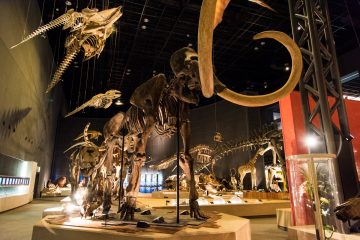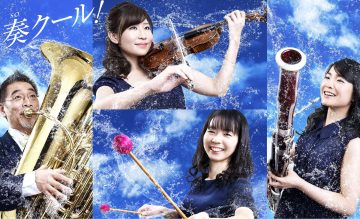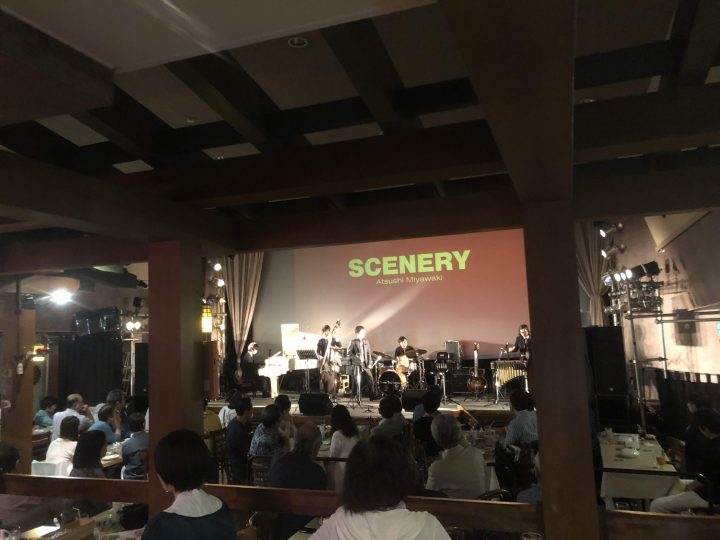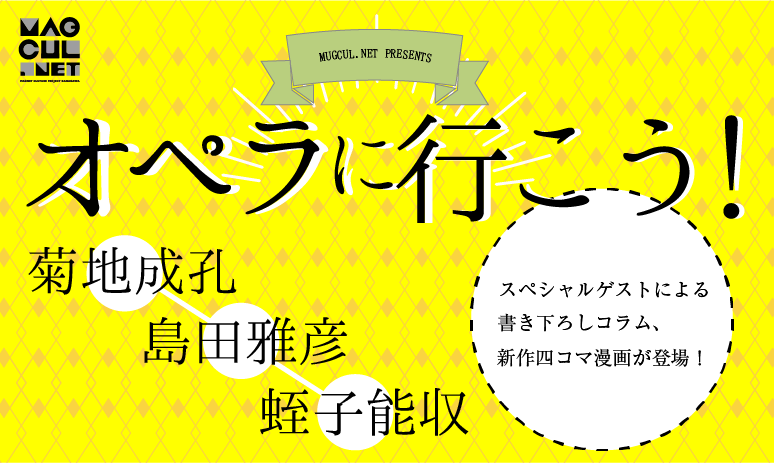
Clicking on the image will automatically scroll to the main text.
Naruyoshi Kikuchi × The Messenian Oracle
For those who have no interest in Baroque, opera, Vivaldi, or even classical music
Naruyoshi Kikuchi (musician/writer)
I'd like to say, "However, at least most people born up to the 20th century...", but I know that even this is quite uncertain these days, so I'll continue ignoring that.However, when you hear the opening of "The Four Seasons", especially the "Spring" part, I think there are many people who will say, "Ah, I've heard this before.On Educational TV."
Or rather, for most Japanese people, Vivaldi is someone who is like, "Chan cha cha la la la. Cha la cha cha la la la," and even so, it doesn't hinder them in their later life, and there is no intention to scare them by saying, "If you don't know more than that, you'll be greatly missing out."
What's more, what is a "Baroque opera" written by Vivaldi in his later years (born in 1738 at age 60, he died at age 63 - for comparison, he was 47 when he wrote "The Four Seasons". Like people in the 20th century, many great people lived long lives, such as the Marquis de Sade at 74, Goethe at 83, and Newton at 85) besides being a composer (he was a prolific composer, and the fact that only "Spring" became so famous is amazing in many ways, even though it's a "classical music thing"), he was also a violinist ("The Four Seasons" is a violin concerto), a priest, a teacher at a music conservatory, and if you stretch it a little, a popular producer?
Despite the abundance of art and entertainment available today, the 20th century hobby of having many hobbies has become like something an ancient person did, with obsessions becoming more localized and religious, to the point where it's hard to understand people who are into things that you aren't into yourself. In this day and age, if you say to me, "In those days, the Venetian school began to lose ground in the opera world due to the rise of the Neapolitan school, and Vivaldi, the representative of the Venetian school, whose popularity began to decline, abandoned his homeland and aimed to perform his own work in Vienna, but the death of his patron Charles VI led Austria to a one-year mourning period and the performance was canceled, and then the famous succession war broke out in Austria when Maria Theresa inherited the throne, and Vivaldi died in despair. This fateful baroque opera, "The Oracle of Messenia," is being premiered in Japan! It's the world's premiere with a staged performance! Messenia will be freed from two monsters! The monsters will be killed by a brave act and anger! And the winner will marry the captive of royal blood! I don't know what you're talking about. I didn't understand what you were saying at the end. Maybe you'll just be dismissed with a "I didn't understand what you were saying at the end.
However, to put it simply, this is quite interesting.
When you turn on the TV late at night, you see commercials advertising performances at XX Hall, right? The ones with people in tights flying around, like in Takarazuka. Oh, is that a ballet? Eh? Ballet and opera are different? Well, it doesn't really matter either way. That's what you're thinking. The fusion of opera and ballet that you have in your head is mostly from the 19th century. The Messenic Oracle is a work from the early 18th century.
Many people may ask, "What's the difference between the 19th century and the 20th century?" Of course, there are many dramatic differences, but if I may give you a strong hook, first of all, in the 18th century, there was no such thing as copyright for music. Isn't that amazing? Imagine that for a moment. Opera in a world without copyright.
So what happens with Baroque operas? Besides the original songs, they also randomly put together hit songs from the time (laughs). I couldn't help but laugh, but it's crazy. It goes without saying that the composer himself, but also the theater manager and the director will discuss it, and even though it's someone else's opera, they'll just add in a song that they think is good. (The score for "Messenia" was lost, so they're recreating it from their imagination. It's kind of crazy, isn't it?)
This alone is quite strange. Premodern times are "subtly" different from our worldview; they are not like ancient times, which are "completely different from the start, and yet have universality that remains unchanged to this day," but rather "a little" different. That's what makes them so bold and refreshingly strange.
The form I mentioned earlier is called "pasticcio," and people who want to protect the authority of the old stuff often talk about it as a nice "collaboration" (and there is that aspect to it), but it's basically a DJ. You put together the tracks yourself (of course, "in advance"), like, "It looks like it's boring, so let's add this song." And because you put it together yourself, it's your song. That's what people normally thought in an era when there was no copyright, or even the concept of rights in music.
Moreover, the songs sung there are, in technical terms, "sung da capo arias by castrati."
A "castrati" is a male singer who has been castrated (of course, there are no such people today, but there was a countertenor who was born with a high-pitched voice or a special skill. For example, the man in "Princess Mononoke"). This has been made into a movie, and the premodern culture of castration (not a punishment, but a special job that gained status and ability by doing it) was common in China, such as eunuchs, and in Japan, such as rakuchi, so it's probably a lot of material in manga, so I'm sure there are many people who are interested. What's amazing is that it's a singer, but <The Messenian Oracle> was produced during the period when castrati were most active in Italian Baroque opera. It's not spectacular like later operas, where the dramaturgy of the story is the main focus (the prototype of movies), but performance-based.
What do you think? For you, Vivaldi only knew "Spring" from "The Four Seasons," but I think your image of him has changed quite a bit.
As for "Da Capo Aria," this is in sonata form, meaning that ABA and A appear twice, but the A in the repeat after the chorus has to be changed slightly by improvisation (though one theory is that it's boring if you don't change it, haha). This too is different from the image of jazz improvisation, but to be honest, for someone who has never heard of it before, the thrill of improvisation in the form of the conclusion to a traditional performing art that looks quite formal is something that they wouldn't get right away.
If you first go to see a geisha and she says, "I'll leave this part of that dance to you," you're probably going to be like, "Oh, I guess that's how it is," but that's what makes it so cool. With Kabuki, you can't understand what she's saying from start to finish. There are a few modern words that pop up along the way, but even so, it's still very interesting. Otherwise, it wouldn't be so popular. (By the way, when "The Messenian Oracle" was first performed, Kabuki was in the Kyoho-Kansei era, and the hanamichi, rises, and revolving stages had just been invented.)
In short, it's like this. Opera and ballet are gorgeous and luxurious, and the makeup is perfect, and you can imagine how fans feel, "I'll pass on that one," and <The Oracle of Messenia> are at least a century apart. But that difference is subtly good.
I have many hobbies, like kabuki, grand opera, contemporary music, 20th century opera, sumo, Takarazuka, mixed martial arts, hip hop, eating and drinking, movies, yoga, but I think that people who aren't into that sort of thing are more likely to get into baroque opera. I think so. Or rather, I think it's interesting now. Before the 19th century. 20th century art and entertainment were quite influenced by the 19th century.
This may be a bit of a stretch to say this, but let's suppose we were both bored, right? Even so, being bored by something from the 19th century or later and being bored by something from the 18th century or earlier have very different effects on the mind and body, even if we are both bored.
Haven't you ever been surprised when an acquaintance suddenly becomes obsessed with something unbelievable? That person suddenly becomes obsessed with Johnny's, that person suddenly becomes obsessed with K-POP, or that girl becomes obsessed with motorboat racing? It's not just acquaintances, you too have the potential to become like that at any time. As someone with many hobbies, I think it's a shame. It's just a trigger, isn't it? At times like that, we tend to shy away from things that already have a pre-established image.
I'm not into 21st century idols, probably because I haven't had the chance. But if I saw "idols from before the 18th century", I might get into Zumba and start being a fan of the 48 groups all at once. "Centuries ago, when the image wasn't yet solidified" - that's what I think is modern freshness.
What's more, Vivaldi, who we have a certain image of, is actually like this. I think it's quite interesting because there is a gap. I will emphasize at the end that there is a serious and meaningful result, but even experts will see that this is a very valuable and meaningful performance. Why not come and enjoy it? It may change your life (or it may not, haha).

Masahiko Shimada × Othello
Hero's Jealousy
Masahiko Shimada (Novelist)
A considerable amount of time had passed since the premiere of "Aida" in 1871 and "Requiem" three years later, and just when there were rumors that his creative motivation was declining due to old age, he finally announced "Otello" in 1887. This long-term plan was apparently called the "Chocolate Plan" after the color of Otello's skin.
Shakespeare's original work was a flood of words, and by piling up elaborate lines, he conveyed to the audience the complexities and mysteries of human psychology. In the opera, he cut out about 80% of the words, and used music to portray the psychology of the characters. The music is several times more eloquent than the music in movies and TV dramas.
There are many memorable scenes, but Otello's victory cry "Rejoice!" (Ruby Esultate) is a very short phrase, but it is a touchstone for singing Otello. Next, during the victory banquet, Iago, the standard-bearer, who is jealous of his lieutenant Cassio, plots to get Cassio drunk and cause a fight. Iago sings the "Drinking Song" at this point, but unlike the famous "Drinking Song" from "La Traviata," it has a strange chromatic melody that induces a drunkenness. The drunken Cassio gets into an argument with the former governor, Montano, and Otello appears again to admonish him. The banquet ends, and only Otello and his wife Desdemona remain, singing a duet "The dark night is now deep." Although it is a song of love and joy, confirming the trust between a husband and wife, the music is accompanied by anxiety. The foreboding of the tragedy that is to come resonates throughout the piece. In his later years, Verdi was also influenced by Wagner, who was born in the same year, and he incorporated Wagner's characteristic harmonies into his own compositions. One result of this is this duet.
Act 2. After Cassio is dismissed from his position as lieutenant, Iago consults Desdemona and suggests that she introduce him to Otello. The entire story of Iago's complicated scheme is played out in these two acts. In the masterpiece baritone aria "Credo", Iago sings "All men are the play of evil fate" and secretly confesses his diabolical scheme to the audience. The audience sees the events unfold according to the scenario Iago has drawn up. If Otello is the protagonist, Iago is the director, and the entire opera is structured as a play within a play.
In Shakespeare's original play "Othello," there is no monologue by Iago comparable to this aria. This is an original for the opera version, and Verdi's deep affection for Iago can be seen here. In fact, Rossini also wrote a work with the same name, "Otello," and Verdi, who respected Rossini, was said to have been very hesitant to make a copy of it. Perhaps because of this, the portrayal of Iago is powerful, and the composition of this work is such that it could be called the opera "Iago." The music is not a resounding melody, but rather a rather divided musical idea that depicts the twisted heart of a character who literally overshadows the main character.
In the third act, Otello falls completely into Iago's trap. A group of envoys arrive from Venice, and while entertaining them, Otello is informed that he will return to Venice and that Cassio will be named as the new governor. Otello loses control of his jealousy, publicly abuses Desdemona, and faints from rage. Otello, who should have been a hero among heroes, believes his subordinate's fabricated story and reveals his true, naive, jealous nature. He suffers from a sense of discrimination as a Moor, thinking that Desdemona does not really love him and will only trust his heart with Cassio, who is from the same town. Anyone who knows the closed-minded nature of Venetians, who are cold to outsiders and only trust their own people, will understand Otello's suspicions.
And in the fourth act, the time of catastrophe draws near. Desdemona is about to fall asleep. She is frightened by Otello's behavior over the past few days, and has a premonition that she will be killed. She tells her maid, Emilia, that if she dies, she wants to be dressed in her wedding dress. Here, one of the most famous soprano arias, "The Willow Song," is sung, followed by "Ave Maria." Desdemona's saintly character, who tries to maintain peace of mind despite having a premonition of death, stands out.
The plot of Iago's plot ends with Otello strangling Desdemona. Emilia discovers Desdemona's body and calls the people in a panic. When it becomes clear that the whole thing was a trap set up by Iago, Otello is in despair and, after lamenting the tragedy in his final aria, "Death of Otello," and expressing his remorse to Desdemona, he commits suicide.
By the way, opera singers don't have a long career. Tenors in particular have a short peak, and can only remain in stardom for around twenty years. Even if they show their talent when they are young, it takes several years to secure a leading role at a major opera house. From then on, they build their careers while being careful to maintain their voice, but once they turn fifty, their voice starts to show signs of fading. They can continue to work, making up for this with technique, but once they turn sixty, they must hand over their roles to the next generation.
As the years went by, the light and bright voices of their youth became heavier and darker, and toward the end of their careers, they attempted the title role of "Otello" in an attempt to give it one last shot, but their success was rare. Even the great Pavarotti did not receive the same ovation as when he finished singing the high C aria in "Il Trovatore."
A tenor who is allowed to sing "Otello" is considered the King of Tenors because only a very limited number of people have a voice suitable for this role. However, once a singer has gained a reputation as an "Otello", he may be able to defend his throne for ten years. Not long ago, it was Jose Cura, twenty years ago it was Placido Domingo, and for fifty years it was Mario Del Monaco. Del Monaco was given the title of "the greatest Otello singer of all time". It is no exaggeration to say that his voice, described as a "golden trumpet", was born to sing Otello.
Along with Don Alvaro in "La forza del destino," Otello is a role that allows the tenor dramatico to show off his talents. Since he is required to express a passionate voice, he needs to have a voice that is almost as thick as a baritone. Although there are no difficult high notes, dramatic expression is required to express the complex character. Rich midrange and low tones are required, and long tones of high A and high B, which are difficult for a baritone, are required, so he cannot compete with Alfredo in "La Traviata" or tenors who are good at Puccini and Mozart.
Del Monaco's virtuoso performance can be seen in the footage of the performance of "Otello" at the Tokyo Takarazuka Theater (1959). When Otello appears and sings the victory cry like a fanfare, the footage shows the choir singers around him completely overwhelmed and stunned. No singer has ever surpassed Del Monaco, who, with his eyes wide open, thundered in the voice of his prime.
If a baritone who can compete with the King of Tenors is not cast, the dramatic effect of "Otello" will be halved. Since villains are often more complicated than good people, a high level of expressiveness is required to subtly let the audience understand their feelings and schemes. The actor must be able to highlight the main character, exert an aura that draws the audience in, and also have the charm of evil, and it is rare to find an entertainer who has all of these qualities. The name of Tito Goppi, who sang Iago in Del Monaco's recent Japan tour of "Otello," cannot be left out. His dark, harsh voice and his devilish gaze glaring at the audience are still talked about today.
If I could see the three best Othellos of their time in my lifetime, I would be truly honored as an opera fan. I have only seen two so far.

Yoshikazu Ebisu's original four-panel comic "Opera"
Manga artist Yoshikazu Ebisu has drawn a new four-panel comic on the theme of opera.


[Bonus] Free souvenir from Parma, Italy
This recruitment has ended.
One lucky winner will receive a souvenir from Parma, Italy, home of Europa Galante led by Fabio Biondi, the musical director of the Oracle of Messenia, and the birthplace of Verdi, the composer of Otello. Parma is also famous as a city of art.
Violet soap & Othello pencil and eraser set.
Napoleon was known to have loved violets, which were brought to Paloma by his second wife Marie Louise when she took over the reign of the French emperor.
This flower, which can be seen as a symbol of the cultural encounter between France and Italy, is still so beloved that it is still used as a motif for souvenirs.
If you would like to receive a gift, please refer to the application details below.
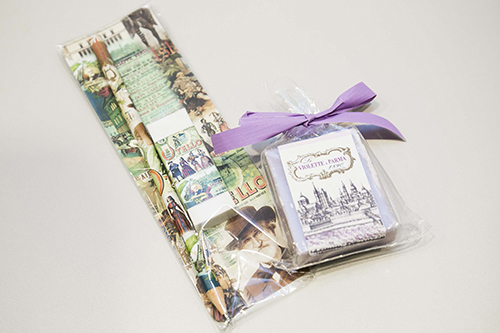
Gift application details
If you would like to receive a gift, please send us the following information by email:
We look forward to receiving your applications.
Application Deadline: Sunday, February 22nd
Application address: info.magcul(at)gmail.com
*Please change (at) to @ when sending.
*Please apply once per person.
□Please apply by email with the following information:
1) Please write "Italy" in the subject line of your email.
2) Please include your name, phone number, and address in the body of the email.
*The lottery results will be notified upon shipment of the product.
*Personal information provided will not be used for any purpose other than the lottery.




